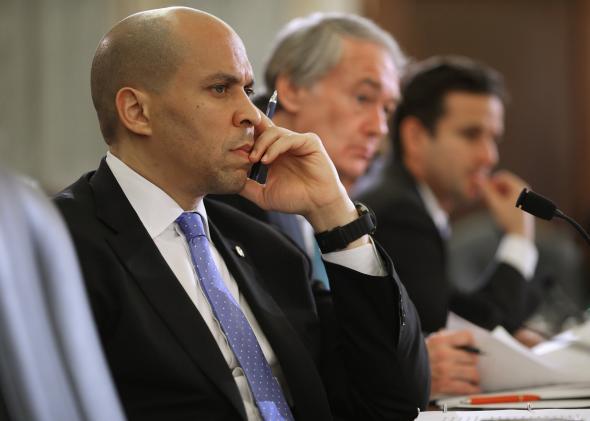Dan Balz and Philip Rucker wrote an article this weekend that’s the latest in a series of pieces from various authors about how Democrats are divided over how “populist” to be. These stories are all pretty good, but I also think they tend to be overblown. Two things you see Democrats argue about a lot are taxes and bank regulation. Elizabeth Warren wants to regulate banks considerably more strictly than Barack Obama does, and Bill de Blasio is much more enthusiastic about high marginal tax rates on high income families than Andrew Cuomo is.
But if you think about these issues from a higher altitude, it’s not clear how significant they are. Not that it doesn’t matter. Obviously a 10 percent leverage ratio is different from an 8 percent one and a 42 percent marginal tax rate is different from a 29 percent one. But in terms of what the parties stand for, you don’t see anyone in the Democratic Party seriously contesting the view that, relatively to the GOP, the Democrats should be the party of high taxes and stringent bank regulation. By the same token, a few years back the Democratic Party was pretty sharply divided between proponents and opponents of equal marriage rights for gay and lesbian couples. But the party wasn’t divided on the question of whether the Democrats should be positioned as the more gay-friendly party. That’s one reason the rather sudden lurch from almost all leading Democrats opposing marriage equality to almost all leading Democrats favoring it went down so smoothly. There was a big change of positions on the policy issue, but actually no change of position on the basic shape of the ideology—Democrats had been the gay-friendly party for a couple of decades, just as they’re the high-tax party and the strict-regulate party, so nobody was confused or surprised.
Which is why I think that if you want to look at a really significant ideological divide among Democrats, you should look at education.
Democrats have, traditionally, been the party that believes that the quality of educational services provided by the government is very, very, very important. Because teachers get paid to provide educational services, they have naturally affiliated themselves with the party that believes that the provision of educational services is important. Conversely, because teachers have been very involved in Democratic Party politics, the Democratic Party has tended to become the vehicle for teachers’ pursuit of their economic interests. The issue arises because one set of people—a broad group including writers and thinkers and donors and activists—has come to the view that policies advancing the economic interests of incumbents teachers are themselves a significant impediment to the provision of quality educational services.
Now you have a group of politicians (Barack Obama, Cory Booker, Rahm Emanuel, Michael Bennet, George Miller) who adhere to education reform ideology and another group of politicians (most Democrats in Congress) who do not.* This is a bit of a second-tier policy issue, so the disputes don’t get as much press as disagreements about bank regulation. But unlike the bank regulation controversy, it actually does raise the question of where will the parties stand. The reform faction has been dominant in recent years without, it seems to me, having actually persuaded most Democrats that it’s the correct faction (they’ve persuaded me, but that only gets you so far). That raises the real possibility that the next Democratic president will stop pushing for tougher teacher evaluations and more charter schools and blah blah and will instead push in the other direction. By contrast, we know that the next Democratic president will be fighting with congressional Republicans about tax cuts and defunding Dodd-Frank and such.
*Correction, Feb. 18, 2014: A previous version of this post misspelled the first name of Cory Booker and the last name of Rahm Emanuel.
